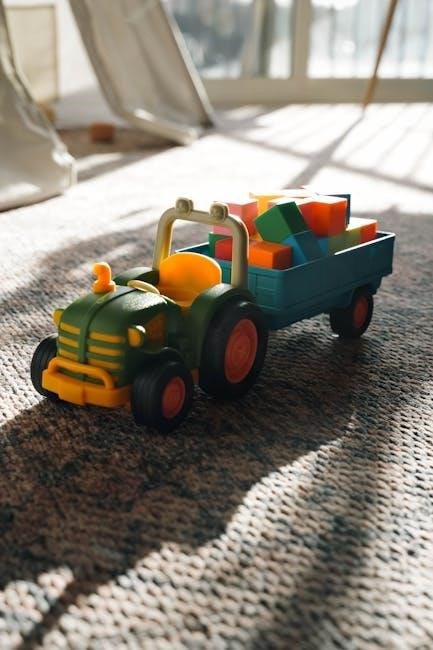
Routines in early childhood provide a sense of security and structure, helping children thrive. They transform daily tasks into learning opportunities, fostering growth and development naturally.
1.1 Defining Routines in Early Childhood
Routines in early childhood refer to repeated, predictable activities that structure a child’s day, such as mealtimes, sleep schedules, and play. These consistent patterns provide a sense of stability, helping children understand expectations and develop a sense of control. Routines are more than schedules; they encompass actions and rituals that foster predictability, emotional security, and opportunities for learning. By establishing clear and repetitive practices, caregivers create an environment where children can thrive socially, emotionally, and cognitively.
1.2 The Role of Consistency in Child Development
Consistency in routines plays a vital role in child development by creating a predictable environment that fosters emotional security. It helps children understand expectations and develop self-discipline. Regular patterns in daily activities, such as mealtimes or bedtime, provide a sense of stability, reducing anxiety and uncertainty. This predictability allows children to focus on learning and growth, laying the foundation for essential life skills like responsibility and time management. Consistency also helps children internalize boundaries, promoting healthy development and a strong sense of self.
Psychological Benefits of Routines for Young Children
Routines provide children with a sense of security and stability, reducing anxiety and fostering emotional well-being. They help regulate emotions and build trust, promoting mental health.
2.1 Enhanced Sense of Security and Stability
Routines create a predictable environment, offering children a sense of security and stability. Consistency helps them feel safe, reducing anxiety and uncertainty. By knowing what to expect, children can better regulate their emotions and develop trust in their surroundings. This predictability fosters emotional comfort and resilience, allowing them to navigate their world with confidence. A stable routine acts as a foundation for healthy psychological development, helping children feel grounded and secure during their early years.
2.2 Development of Self-Discipline and Responsibility
Routines play a vital role in cultivating self-discipline and responsibility in early childhood. By following consistent schedules, children learn to prioritize tasks and manage their time effectively. These structured patterns of behavior help them understand expectations and complete tasks independently. Over time, this fosters accountability and a sense of duty, which are essential for their personal and academic growth. Mastering these skills early on sets a strong foundation for future success and lifelong self-management.
Impact of Routines on Social-Emotional Development
Routines foster emotional stability and cooperation, helping children develop essential social-emotional skills for positive interactions and emotional well-being.
3.1 Improving Emotional Regulation in Children
Routines provide a predictable environment, helping children manage emotions effectively. Consistent schedules reduce anxiety, teaching them to anticipate and respond to transitions calmly. By incorporating activities like dressing and washing hands into daily routines, children learn self-regulation. This structure fosters emotional stability, enabling them to handle challenges with resilience. Over time, routines empower children to develop self-awareness and control, laying a strong foundation for emotional well-being and social interactions.
3.2 Encouraging Cooperation and Social Skills
Routines foster a sense of community and cooperation among children. Shared activities, such as group clean-up or mealtimes, teach teamwork and mutual respect. Predictable interactions during routines help children practice social cues and communication. For example, taking turns or using polite language becomes second nature when reinforced daily. These experiences build essential social skills, preparing children for collaborative environments and fostering lifelong abilities to connect and work with others effectively.
Routines and Cognitive Development
Routines enhance cognitive development by supporting memory and problem-solving skills, helping children understand cause and effect through structured activities.
4.1 Boosting Memory and Problem-Solving Skills
Routines play a crucial role in enhancing children’s memory by repeating tasks, which reinforces learning and retention. Structured activities, like puzzles or matching games, improve problem-solving abilities. Consistency helps children anticipate and understand sequences, fostering critical thinking. Repetitive tasks build neural pathways, strengthening cognitive functions. This predictability allows children to focus on mastering skills rather than navigating uncertainty, creating a strong foundation for academic and cognitive growth.
4.2 Preparing Children for Academic Success
Routines lay the groundwork for academic success by teaching children structure and predictability. Regular patterns of learning and play help kids develop time management skills and task completion habits. Consistency fosters a love for learning, making transitions to formal education smoother. By practicing sequencing and following directions, children build foundational skills essential for classroom environments. These habits cultivate self-discipline, preparing them to engage effectively in academic activities and thrive in school settings.

Establishing Effective Daily Routines
Creating consistent routines helps children feel secure and develop self-regulation skills. Involving kids in planning fosters ownership, while flexibility ensures adaptability to changing needs and environments.
5.1 Creating a Structured Schedule for Kids
Creating a structured schedule for children involves organizing daily activities into a predictable sequence. Start with simple, age-appropriate tasks like morning routines or bedtime preparations. Use visual aids like charts or timers to help kids understand the sequence. Involve children in the planning process to encourage ownership and cooperation. Ensure flexibility to adapt to changing needs while maintaining consistency. A well-structured schedule promotes a sense of control and responsibility, helping children transition smoothly between activities and develop time management skills early on.
5.2 Involving Children in Routine Creation
Involving children in routine creation fosters a sense of ownership and responsibility. Encourage kids to contribute by discussing their preferences and incorporating their ideas into the schedule. Use visual aids like charts or calendars to help them understand and participate. Assign age-appropriate tasks, such as setting the table or packing their bag, to teach accountability. This collaboration not only strengthens their commitment to routines but also enhances their problem-solving and decision-making skills, preparing them for independence and self-management in the future.
The Role of Parents and Caregivers
Parents and caregivers play a vital role in establishing and maintaining routines, providing consistency and guidance. Their involvement ensures children feel secure and develop essential life skills.
6.1 Modeling Consistent Behavior for Children
Parents and caregivers must model consistent behavior to help children understand and follow routines. By demonstrating predictable actions and maintaining a structured environment, adults create a sense of reliability. This role-modeling teaches children the value of responsibility and helps them develop self-regulation skills. Consistency fosters trust and stability, making it easier for children to adapt to daily schedules. Adults’ actions serve as powerful learning tools, shaping the child’s ability to embrace routines and thrive in organized settings.
6.2 Communicating with Children About Routines
Effective communication is key to helping children understand and embrace routines. Explaining the purpose and structure of routines in simple, age-appropriate language fosters cooperation. Using visual aids like charts or schedules can make routines clearer. Involving children in discussions about their daily plans encourages a sense of control and responsibility. Open dialogue helps children feel heard and reduces resistance to following routines, creating a collaborative environment for learning and growth.

Challenges in Maintaining Routines
Maintaining routines can be challenging due to resistance from children, unexpected events, and balancing flexibility with consistency. These factors require patience and adaptability to ensure stability.
7.1 Flexibility in Routine Implementation
Implementing routines flexibly is crucial, as it allows adaptation to changing needs and unexpected events. While consistency is key, rigid structures can lead to frustration. Parents and caregivers should balance predictability with the ability to adjust schedules as circumstances evolve. This flexibility fosters resilience and teaches children to adapt gracefully to life’s unpredictability. By remaining responsive to individual needs, caregivers can ensure routines remain effective without becoming overly restrictive, promoting emotional and behavioral stability.
7.2 Addressing Resistance from Children
Children may resist routines due to a desire for control or independence. To address this, parents and caregivers should remain calm and consistent, explaining the purpose of routines. Involving children in creating their own schedules can foster a sense of ownership and cooperation. Offering choices within established boundaries also empowers them without compromising structure. Positive reinforcement, such as praise for adherence, encourages compliance. Flexibility and understanding are key to navigating resistance while maintaining the benefits of routines for their development.

The Importance of Documentation
Documentation tracks children’s progress, ensuring consistency and accountability in routines. It informs parents about their child’s daily activities, fostering collaboration and understanding of their development.
8.1 Tracking Progress Through Routine Documentation
Documentation serves as a tool to monitor children’s progress, identifying developmental milestones and areas needing support. By recording daily routines and activities, educators can assess growth, ensuring consistency and continuity in care. This data helps tailor routines to individual needs, fostering a supportive environment. Regular documentation also provides insights into how routines contribute to cognitive, social, and emotional development, allowing for informed adjustments. It bridges communication between educators and families, ensuring alignment in supporting the child’s overall well-being and education.
8.2 Sharing Routine Information with Families
Sharing routine information with families fosters collaboration and ensures consistency in a child’s care. By communicating daily schedules and activities, educators help parents understand their child’s experiences. This transparency builds trust and supports continued learning at home. Sharing documentation also allows families to address any concerns or needs promptly. Collaborative efforts between educators and families create a unified approach, promoting the child’s overall development and well-being. Consistent communication ensures a cohesive environment for the child to thrive.

Cultural and Individual Differences
Routines must respect cultural values and individual needs, ensuring inclusive practices that honor diverse backgrounds and promote equitable opportunities for all children to thrive.
9.1 Adapting Routines to Cultural Contexts
Adapting routines to cultural contexts ensures inclusivity and respect for diverse traditions. Incorporating cultural practices into daily schedules fosters a sense of belonging and cultural identity in children. Caregivers must be sensitive to varying values and customs, ensuring routines reflect the unique needs of each child’s background. This approach promotes cross-cultural understanding and creates an environment where all children feel valued and supported. Involving families in routine creation strengthens cultural connections and enriches the learning experience for everyone involved.
9.2 Considering Individual Child Needs
Considering individual child needs ensures routines are tailored to each child’s unique requirements. Every child has distinct developmental pace, personality, and preferences. Personalized routines foster a sense of security and support overall development. Caregivers should observe and adapt routines to meet these individual needs, ensuring each child feels comfortable and engaged. This approach promotes independence, confidence, and a positive outlook on daily activities. Collaborating with families helps align routines with home practices, reinforcing consistency and support for each child’s unique journey.
Routines in early childhood are foundational for healthy development, fostering security, skill-building, and emotional growth. Consistency guides children toward independence and lifelong success.
10.1 Summary of Key Points
Routines in early childhood are essential for providing structure, security, and consistency. They play a crucial role in fostering emotional, social, and cognitive development. By establishing predictable patterns, routines help children develop self-discipline and responsibility while creating a sense of stability. These practices also support skill-building and cooperation, preparing children for future challenges. Parents and caregivers are key in maintaining these routines, ensuring they adapt to individual needs and cultural contexts. Overall, routines lay a strong foundation for lifelong learning and well-being.
10.2 Final Thoughts on the Value of Routines
Routines are a cornerstone of early childhood development, offering stability and structure that foster growth. They empower children to build self-discipline, emotional resilience, and essential life skills. By creating predictable environments, routines help children navigate the world with confidence. Parents and caregivers play a vital role in maintaining these practices, ensuring they align with individual and cultural needs. Ultimately, routines are not just schedules—they are tools for nurturing holistic development and setting the stage for a lifetime of success and well-being.